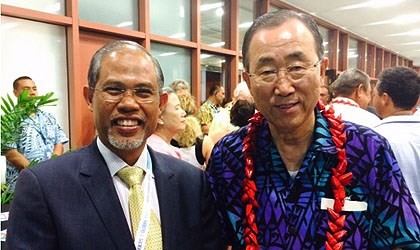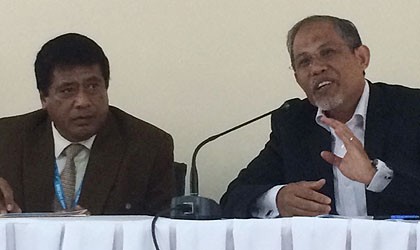Senior Minister of State (SMS) for Foreign Affairs and Home Affairs Masagos Zulkifli is in Samoa to attend the Third International Conference on Small Island Developing States (SIDS) from 1 – 5 September 2014.
2 SMS Masagos attended a breakfast meeting hosted by Nauru for the members of the Alliance of Small Island States (AOSIS) and United Nations Secretary-General Ban Ki-moon. The meeting was an opportunity for AOSIS members to share their developmental challenges and concerns about the environment and climate change with the Secretary-General. In addition, SMS Masagos spoke in a panel about Singapore’s development experience at a side-event on “Building Resilience in Small Island Developing States through Foresight” organised by the United Nations Development Programme (UNDP) and the Government of the Kingdom of Tonga. UNDP Administrator Helen Clark and the Prime Minister of Tonga, Lord Tu’ivakano were also panellists at the side-event.
. . . . .
MINISTRY OF FOREIGN AFFAIRS
SINGAPORE
1 SEPTEMBER 2014
SMS’ speech at the joint side-event entitled “Building Resilience in Small Island Developing States through Foresight”
Excellencies,
Distinguished guests,
Friends and colleagues,
1 A very good morning, and thank you Prime Minister Lord Tu’ivakano and Ms Clark for your enlightening speeches on foresight and how it can be used to support sustainable development amongst SIDS.
SIDS – Overcoming Vulnerabilities through Resilience
2 Singapore is honoured to be invited to this side event with the Kingdom of Tonga and the UNDP. As a member of both the Small Island Developing States (SIDS) and the Alliance of Small Island States (AOSIS), Singapore shares many of the concerns and challenges faced by SIDS. While we may differ from one another in terms of cultural heritage, social norms, and stages of development in our respective economies, we share a common trait – heightened vulnerability. In particular, I am referring to the peculiar environmental and economic vulnerabilities of SIDS with which we are all familiar.
3 There is a very small margin for error for any of us. Any sudden economic or environmental shock could be devastating. It is thus essential to improve our resilience and make the best use of our resources. Foresight can be a useful planning tool if applied correctly. It involves the scanning of trends and issues confronting a nation, engaging stakeholders, and analysing the policy options available. Governments can then translate this by clear and resolute policy implementation into greater resilience.
4 It is not, however, a magic bullet. It will not substitute for good governance or sound administration. In the earlier stage of Singapore’s development, we were focused on meeting the basic needs of our people. Foresight was not necessary; we knew what the problems were. What we had to guess at was how to solve them. Since our independence in 1965, Singapore has had to live with the realities of our size. We accept that we have no control over the greater forces that govern global events. We have therefore been forced to adapt to change and have tried to build resilient systems, to increase our chances of surviving whatever the world throws at us. We are keenly aware that historically, few city states have survived. We have been flexible in our policies, kept what worked and changed what did not. We have been forced to be pragmatic, non-ideological and outcome-oriented in addressing our economic, social and developmental needs.
5 We were forced to take a hard look at the few options we had to achieve economic growth, which is the basis of all development. Upon the advice of the UNDP, we ignored the conventional wisdom of the time, and developed investor-friendly policies to attract multi-national companies, such as tax incentives and waivers, state provision of industrial infrastructure, a harmonious labour-relations framework, and policies to maintain and extend a clean and green environment to differentiate ourselves from our competitors.
6 We have had to continually adjust to changing global conditions. When our labour-intensive industries faced rising costs in the 1970s, we invested in education and human resource development so that we could move up the economic value chain. We diversified our economy to reduce our dependence on any one particular sector and to build up our resilience against external shocks. We are still doing this today, in response to the most recent global financial crisis. There is not, and never will be a time when we can say “we have arrived, we are a developed country, there is no more to do”. What does not constantly adapt to the changing global environment will not survive.
7 It is important to recognize that the new world is shaped not by trajectories alone but also by the impact of unpredictable game changers. Forecasting cannot assume a straight line projection. No one could have predicted that an internet company like Facebook would today have a market capitalization of nearly US$200 billion – a sum larger than the GDPs of many of countries present here. Travel advisors have been made redundant by internet websites like The Lonely Planet. Encyclopedias by Wikipedia and Google. Cities like Bangalore in India have seized the opportunity to create large numbers of competent but “cheap” computer programmers who have headed in large numbers for Silicon Valley. New technology and the ability to ride on it, has generated wealth for a whole new group of individuals with the right skills and know-how. Disruptive technology advancements have had powerful, if not revolutionary effects that few foresaw. Game-changers and “Black Swan” events pose a challenge to forecasting methods and their efficacy. The best coping strategy for Governments is not to invest in more forecasting models but to be flexible and prepared for worst-case scenarios. As Nassim Taleb who coined the term “Black Swan” mentions in his book, we should constantly ask ourselves “what if” and consider counter-factual scenarios.
8 Ultimately, I would like to highlight three points. First, both long-term thinking and long-term policy implementation have been important factors in Singapore’s survival up to this point. All the foresight in the world will not help if a good policy is not correctly and consistently implemented. Second, we are constantly aware that as one of the SIDS, we are price takers and not price setters. We worked with what we had, not what other countries told us we should have. No policy or institution is valid for all times and all places, and every one of us is different and faces slightly different challenges. There is no one-size-fits-all. Third, it is important to experiment with policies, and discard or adapt them when they are no longer useful. While foresight analysis can be useful in examining alternative scenarios, it is only of relevance once basic needs have been met. It is arguably more important for us to be pragmatic in assessing both our challenges and the means that are available to us to meet them. We should also try to be flexible in our approach and be prepared to adjust our policies in response to change.
9 The International Year of the SIDS and the third SIDS Conference offer us both a challenge and an opportunity. This occasion allows us to take stock of our challenges, review our imaginings of the future, and develop viable options that will allow us to develop in a sustainable manner. We welcome the UNDP and its role in developing foresight tools for the use of SIDS. We hope that Tonga’s experience in this area can be shared with the wider SIDS membership.
10 In Singapore’s experience, a one-size-fits-all approach for all countries does not suit complex situations. There is no single solution to the different problems that we share. SIDS should experiment with multiple concepts in policy design so as to find the method that works best for each in the long-term.
Thank you.

 SMS Masagos with UN Secretary-General Ban Ki-moon. (Photo: MFA)
SMS Masagos with UN Secretary-General Ban Ki-moon. (Photo: MFA) SMS Masagos with Prime Minister of Tonga Lord Tu’ivakano. (Photo: MFA)
SMS Masagos with Prime Minister of Tonga Lord Tu’ivakano. (Photo: MFA)